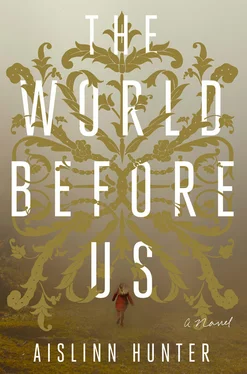Walking past marble pillars and carpets wrapped in plastic, Jane thinks how strange it is that she has tried and failed to properly imagine this place. She recalls what she knows of George and Prudence, of Norvill, and can’t even decide if the waist-high pillar in front of her would have hosted the sculpted head of a beautiful girl or Theseus slaying the Minotaur. At the end of the hall she opens a heavy wood door and is shocked to find a deteriorating wall-to-wall animal mural in what must have been the nursery or schoolroom. Ten wild animals are arranged around its perimeter: a shaggy lion in full-toothed roar, an elephant with his trunk trumpeting toward the ceiling. There’s a sanguine giraffe drawn out of proportion, a gorilla in a top hat and a mean-looking tiger so faded from the sunlight streaming through the window that he looks as if he’s receding into a far-off dream. Jane thinks about the young George Farrington as William had described him in the last chapter of his book: a self-conscious child, singular in his focus, constantly at his mother’s knee. And Norvill as a boy? Nothing that she has read would say. Charlotte’s diaries stick mostly to the details surrounding his visits to the museum or to the house to see Edmund, with little reference to what kind of man he was, let alone what kind of child. The Chester archives and Edmund’s accounts state when Norvill did and did not appear for meetings at the museum, what contributions he made by way of geological specimens, but offer nothing about what it might mean to spend formative days surrounded by tribes of wild animals — the painted ones in the schoolroom or the stuffed ones under plastic in the main hall.
When she finds the parlour near the front of the house, Jane lifts the sheet off the horsehair sofa and sits. The black leather is split on the curve of the arm so that she can slip her fingers into its seam and feel the bristled fibres. There are a half-dozen inventoried boxes along the wall of the parlour and a stuffed grouse shrouded in clear wrapping, a mahogany longcase clock beside it. The ceiling is lower than she expected, and the wall where she imagined a set of watercolours hanging from ribbons is bare. The view from the window is of the great expanse of the front lawn. This room, or perhaps George’s study next door, would have been lit up on the night of N’s disappearance — would have cast the light Leeson and Herschel and N were drawn toward after their long walk from the Whitmore.
Some of us have been in Inglewood House before, can conjure the objects that lined the shelves and cupboards, the pastoral oils that hung from the walls, embellishments we once touched or were responsible for. The plate was kept here, this book cabinet was locked, flowers were to be placed on this mantel, an armoire was located in this nook, the gun room was down that hall, this was the larder, the scullery; the laundry was pushed down this chute to be collected in the morning . We are like inventors, staring at a machine that isn’t there, that we seem to make exist out of the whirl of our own ardour. This, after all, is what we have been after — bits and pieces of stories we’ve lived, images that sail back to us as we enter a room, even if what we glean is the kind of knowledge that comes from village gossip — how one year the season’s bag of pheasants exceeded three hundred and George complained that it was more trouble to find mouths willing to eat so much bird than it was to go out on horseback and procure it. And so we see him here in this room, greeting a visitor or hastily reading a letter; or we glimpse Prudence upstairs in her cotton nightdress with her hair braided — recall how, in her last years, she insisted on starting each morning with three tinctures, how watching her open her mouth to receive them was like watching a baby bird.
You might ask what it’s like to conjure such moments, to say that Herschel once sat where Jane is sitting and that Leeson stood in this very room and bowed for Prudence with a Romantic flourish she secretly liked. To suggest that the three clocks plunged on with their awkward ticking, each half-second announced like some fissure in physics the idiot thinks we can slip into. To remember N at the door watching the footman, then darting away when he went to find Farrington. To know that Farrington, assessing the situation quickly, took over before the footman realized that the number of the party had changed.
“ Twoo ,” one of us says, and Cat sighs and air-kisses a circle around all of us.
The poet wanders off to the study, the theologian stares at the grouse, and the one with the soft voice sings a song that must be what the living call a lullaby.
Is what we are conjuring guesswork? Or a kind of love? We know that Norvill once stood in the door to his childhood nursery, his face clouding over as he read a letter from Charlotte. We know that he crumpled the note and threw it against the wall, and that he was made desperate because of it. Admittedly some of our knowledge is conjecture, but some is fact gained by access and some is understanding human nature, our dispositions imposing themselves on the maps made by others.
And, too, one of us happened to pass him in the doorway in the way that people constantly pass by each other: the seen and the unseen, the preoccupied and the perceptive. The body is a miraculous thing: an assemblage of struts and muscles and nerves; two hundred and six bones placed exactly under a corset of muscle and ligament; and eyes to see, ears to hear. The hand that curls around a leaf of scented paper is a marvel to watch, and so too is the arrangement and rearrangement of lines on a face marred with unhappy thoughts.
When the young man who has been working in the gardens walks down the servants’ steps and into the kitchen of Inglewood House, Jane is thumbing gently through a box of books in the library. She doesn’t hear him, but Sam cocks his head and turns toward the sound, then trots across the main hall to the top of the stairs. They’ve been in the house nearly two hours. After the first fifteen or twenty minutes Jane had relaxed, realizing they weren’t going to trip any alarm wires or walk into a security guard; the house is clearly in a state of suspension, the Trust probably local enough to live up to its name.
Jane notices Sam’s agitation and thinks he might need to go out to pee. She takes a last look around the library and follows him down the stairwell. When she gets to the bottom step she sees a young man, in a T-shirt and dark trousers, standing at the sink with his back to her. He’s rinsing his hands with water from a plastic bottle. Jane can make out the fuzzy interference of music playing in his earbuds. Stuck on the bottom step, she glances at Sam, who is standing ten feet behind the stranger, undecided whether she should sneak across the kitchen to the exit or go back upstairs until he’s gone. She’s about to step down and cross between the built-in pantry and the sinks when he turns around.
“Whoa, Jesus!” He plucks out his earbuds and says, more politely, “Sorry, you scared me.”
Jane smiles. He’s eighteen, maybe nineteen, has a mop of dark hair and patches of stubble on his chin. She can see now that he’s wearing navy overalls, the upper part cinched around his waist and the knees caked with dirt. She tries to sound casual. “I didn’t know anyone was working today or I would have said hello on my way in.”
He looks her up and down quickly, the way boys his age tend to do — interested because she’s a woman, but vaguely dismissive because she’s older — and then he taps his thigh to call Sam over, and the dog bounds up to him without so much as a backward glance at Jane, leaning in with his full weight while the kid kneels down to pet him. The boy angles his head toward the back gardens, says, “We’re running a bit behind, and it’s my dad’s company, so two of us are doing weekends. I thought you lot weren’t coming back till Monday?” He reaches into his pocket to turn his music off and flinches when he catches the cut on his hand on the seam. He lifts up his hand to inspect it. There’s a smear of blood across his palm.
Читать дальше












